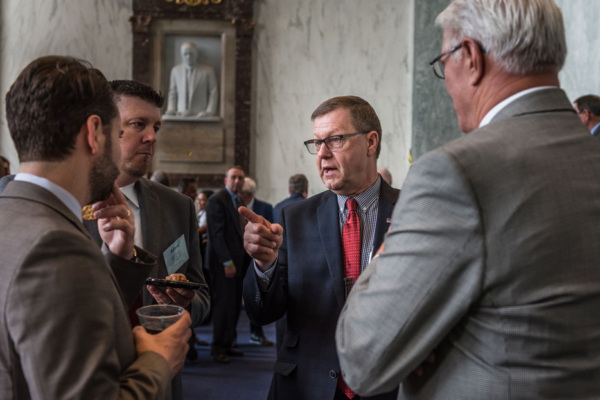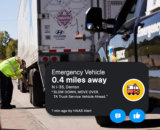Every aspect of the truckstop and travel plaza industry is affected by federal and state laws and regulations, and even well-meaning lawmakers can make decisions without realizing the real-world impact they can have. That is why it is essential for business owners and their employees to share their stories with their elected officials.
It is impossible for legislators to know everything, so they welcome the opportunity to learn from those in the industry, said Joe Zietlow, NATSO board member and industry and trade association manager for Kwik Trip Inc. “If you’re not involved, somebody else is educating them,” he explained. “When you’re able to be the expert and explain things to people, they appreciate that. That is why they want to see us.”
Kwik Trip, which operates 650 convenience stores in Wisconsin, Minnesota and Iowa, encourages its 23,000 employees to take part in its grassroots efforts at both the state and federal level. “Grassroots is the most effective way to get things done,” Zietlow said. “Our CEO understands that if you’re not at the table, you’re part of the meal. You have to be there and out in front of all of these things so you know what it is going on.”
Jessica Frend, a government affairs advisor at Steptoe & Johnson LLP’s Washington, D.C., office and a NATSO consultant, said Kwik Trip has adopted a culture of engagement. “From the top down, they’ve embraced the importance of having their employees recognize how policies at the state, local and federal level impact their businesses and why they should care about that,” she said. “That then makes it easier to inspire those employees.”
Visiting with Wisconsin Lawmakers
Earlier this year, 73 Kwik Trip employees visited with Wisconsin lawmakers. “We covered every county in Wisconsin that we have a store in,” Zietlow said.
The Kwik Trip team spent time sharing information on what it would mean to fuel retailers if the government got rid of the minimum markup law on gasoline. “That would drop the market out and allow the big box retailers to come in and run the single-store operators out of business,” Zietlow said.The Kwik Trip employees all dressed the same, which increased their visibility, and followed talking points Kwik Trip created. Zietlow added that Kwik Trip gives its employees the autonomy to speak to their legislators and encourages them to form relationships with their elected officials. “We trust our people. It empowers them,” he said. “A lot of their legislators know them because they see them in their store and they’re voters in their district. They get more attention than if a lobbyist came in and talked to them. They’re real.”
CONNECTING IN MINNESOTA AND IOWA
Kwik Trip took the same approach in Minnesota where 20 co-workers took to the state capitol and in Iowa when 15 co-workers visited Capitol Hill to speak with lawmakers about bottle recycling.
In Iowa, retailers have to take back all bottles and cans they sell based on a law passed in the 1970s. “We think it is time to change,” Zietlow said, adding that collecting and storing bottles and cans creates a safety issue within the stores.
Fifteen Kwik Trip store leaders attended a Senate committee meeting and shared their firsthand perspective on how the piles of bottles and cans affected their jobs and their stores. Zietlow said their testimony stood out among the information provided by the paid lobbyists that filled the room. “I could just see the committee sit up and pay more attention because they talked about real life in a store,” he said. “It is just so much more effective when we’re able to do things like that.”
SHARING KNOWLEDGE IN WASHINGTON, D.C.
Zietlow said grassroots efforts really are a matter of sharing knowledge and telling stories. “When our people in Iowa told their story, it was education,” Zietlow said. “When we go to Washington, D.C., we do more educating than asking.”
Zietlow said he tracks industry issues via the various trade associations the company belongs to, including NATSO, and through the relationships it has formed. “We’re so connected that we have legislators call us,” he said.
Relationships and trust are at the heart of grassroots efforts, Zietlow said. “You have to make a friend before you can ask a friend for help. You get to know people and you have a relationship with them,” he said.
NATSO's Day on the Hill is an excellent jumping off point for those looking to get started with grassroots lobbying. “It teaches you how it works, and NATSO handles everything for you. Once you're comfortable with that, you can bring your story home and build out a program from there,” Frend said.
Another effective way to connect with lawmakers is by inviting them for a site visit. “Whether it is a visit to corporate headquarters or a truckstop, it is a great way to show members how various policies and regulations impact the business on a day-to-day basis,” Frend said. “It is a great opportunity for members of Congress to meet their constituents.”
NATSO can help operators coordinate visits and be on site the day of to make sure it is a smooth visit. “We can also coordinate press for them,” Frend said.
Even if a return on investment in the time spent on grassroots efforts isn’t immediately seen, it will come, Frend said.
Subscribe to Updates
NATSO provides a breadth of information created to strengthen travel plazas’ ability to meet the needs of the travelling public in an age of disruption. This includes knowledge filled blog posts, articles and publications. If you would like to receive a digest of blog post and articles directly in your inbox, please provide your name, email and the frequency of the updates you want to receive the email digest.


